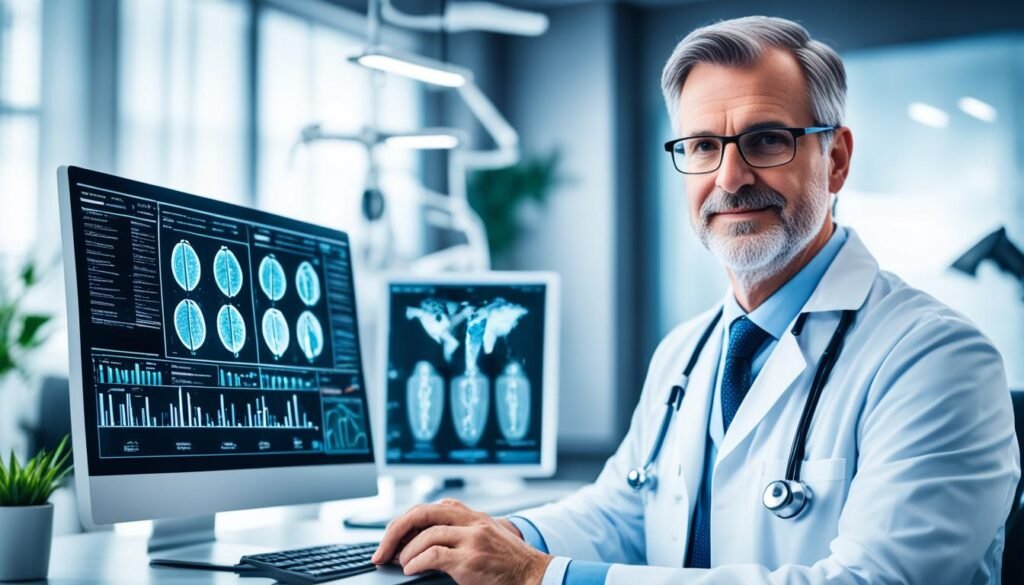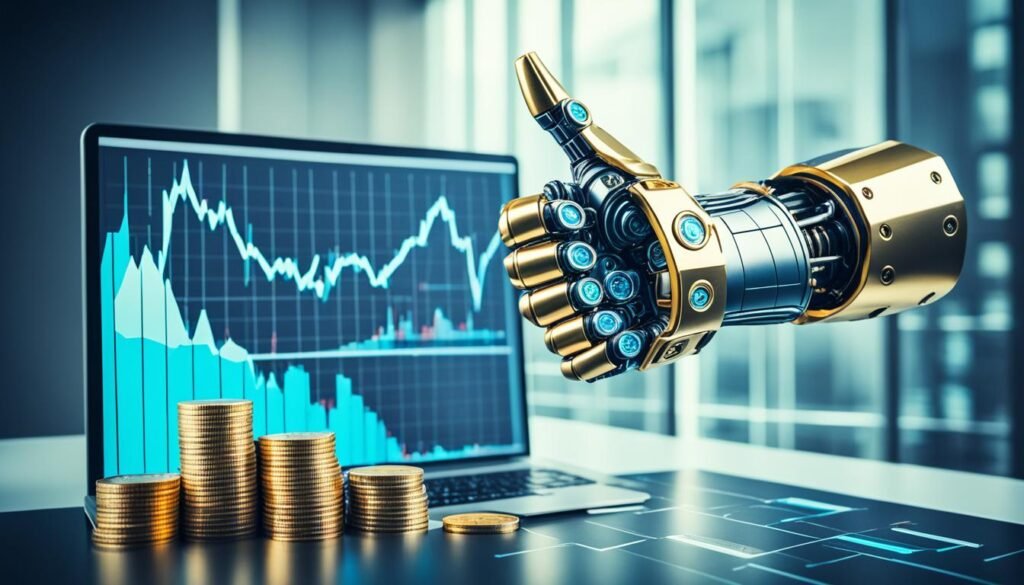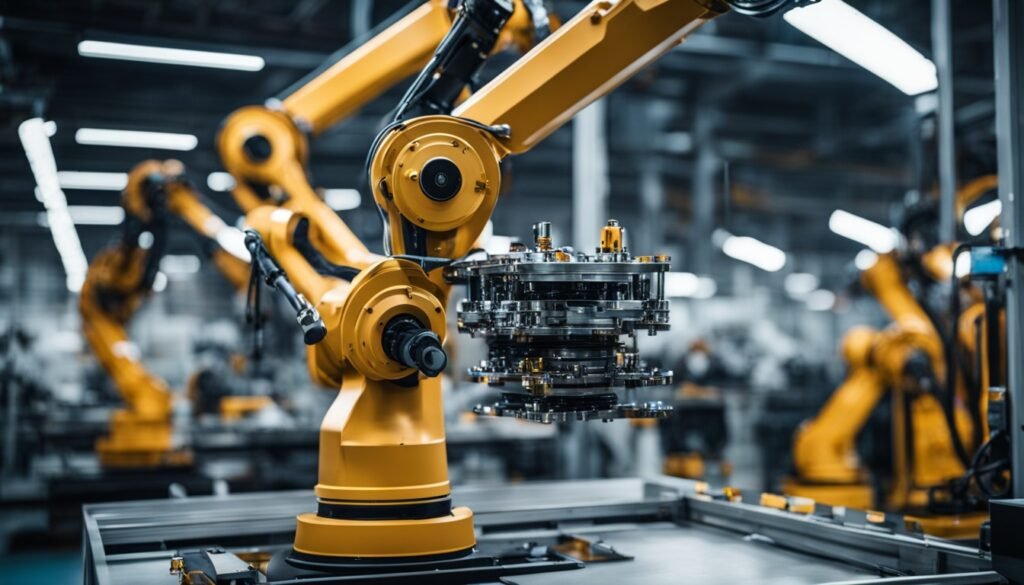Artificial Intelligence (AI) is now a key part of our world, changing how industries work globally. A report by Grand View Research says the AI market will grow to $1,811.8 billion by 2030. This is up from $136.6 billion in 2022, with a growth rate of 38.1% each year. This shows how big of an impact AI is having on our lives.
This article will look at the main ways AI is used today. We’ll see how it’s changing different areas, like improving customer service and healthcare, and making manufacturing and transportation better. By learning about AI’s many uses, you’ll see how it can help you and your business.
Key Takeaways
- AI is transforming industries worldwide, with a projected market size of $1.8 trillion by 2030.
- AI applications span diverse sectors, including e-commerce, healthcare, finance, manufacturing, and transportation.
- AI-powered solutions are driving enhanced customer experiences, improved decision-making, and increased efficiency.
- Understanding the real-world applications of AI can help you leverage this technology to benefit your own life and business.
- The rapid growth of AI highlights its transformative potential and the need to stay informed about its evolving capabilities.
Introduction to AI Applications
Artificial Intelligence (AI) is changing how we live, work, and interact with the world. It’s now in many industries, like healthcare, finance, transportation, and education. As AI gets better, it’s being used more and more, making things more efficient and smart.
What is Artificial Intelligence?
Artificial Intelligence lets systems or programs think, learn, and decide like humans. It uses machine learning and deep learning to make computers act like our brains. AI can look at lots of data, find patterns, and make smart choices. This makes many tasks more productive, efficient, and better at solving problems.
The Rise of AI in Various Domains
AI has grown a lot in recent years. It’s now in almost every industry, changing how we do things. From healthcare to education, AI is making a big difference. Some of the key areas where AI has made big strides include:
- Personalized recommendations in e-commerce
- Intelligent chatbots and virtual assistants for customer service
- Improved medical diagnostics and treatment planning
- Automated production lines and predictive maintenance in manufacturing
- Self-driving vehicles and intelligent traffic management systems
- Personalized and adaptive learning in education
- Facial recognition and threat detection for security and surveillance
As AI keeps getting better, its effects on industries and our lives will grow. This will lead to a more advanced and efficient future.
“Artificial Intelligence is the future, not the past.” – Tony Fadell, founder of Nest

AI in E-Commerce and Customer Service
Artificial Intelligence (AI) has changed the e-commerce world. It now shapes how businesses talk to customers and run their operations. AI technologies like personalized product suggestions and smart chatbots are key to great customer experiences.
Personalized Recommendations
AI helps make product suggestions based on what customers like and buy. For example, Amazon uses machine learning to offer products that match what each customer wants. This approach boosts customer engagement, sales, and happiness. Studies say it can increase revenue by 10-15%.
Chatbots and Virtual Assistants
AI-powered chatbots and virtual assistants are now key in e-commerce customer service. They can answer many customer questions and handle orders. This lets live agents focus on harder issues, making customers happier faster. Using AI in customer service also brings a better return on investment than old marketing ways.
The future of online shopping is looking bright with more AI. As businesses use AI more, they can expect more sales, loyal customers, and a big edge over competitors.
| AI Application | Impact |
|---|---|
| Personalized Recommendations | 10-15% potential increase in revenue and retention |
| Chatbots and Virtual Assistants | Higher ROI compared to traditional marketing |
| Dynamic Pricing | Optimized pricing based on supply and demand |
| Logistics Optimization | Improved inventory management and demand forecasting |
“Implementing AI in e-commerce helps businesses enhance the customer experience, optimize pricing, improve logistics operations, and increase sales.”
AI in Healthcare and Medical Fields
The healthcare industry has seen a big change with artificial intelligence (AI). AI is making a big impact, from better diagnostics to custom treatment plans. It’s changing how we care for patients.
AI uses advanced algorithms to look through lots of medical data. This helps doctors find diseases faster and more accurately. It’s especially useful in fields like radiology and ophthalmology. AI can spot things that doctors might miss in medical images.
AI is also making healthcare more personal. It uses machine learning to create treatment plans based on a patient’s genes, health history, and lifestyle. This can lead to better treatments, fewer side effects, and better health outcomes.
Optimizing Drug Discovery and Development
The pharmaceutical industry is also seeing big benefits from AI in drug discovery. AI can go through huge amounts of data to find potential new drugs. It can also predict how drugs might work with the body. This makes finding new medicines faster and more effective.
As AI becomes more common in healthcare, we’ll see more progress in personalized medicine and better patient care. The future of healthcare is closely linked with AI technology.
| AI Applications in Healthcare | Benefits |
|---|---|
| Diagnostic Imaging Analysis | Improved accuracy and speed in disease detection |
| Predictive Analytics for Treatment Plans | Personalized and targeted therapies |
| Drug Discovery and Development | Accelerated identification of promising drug candidates |
| Patient Monitoring and Management | Enhanced patient outcomes and reduced healthcare costs |
“AI is transforming healthcare by enhancing diagnostics, personalizing treatments, and optimizing patient care. The future of medicine is undoubtedly intertwined with the advancements in AI technology.”

where ai is used in Finance and Banking
Artificial intelligence (AI) has changed the finance and banking world. It offers many applications that are changing how financial services work. AI helps with fraud detection, algorithmic trading, credit scoring, and wealth management. It’s key in making the sector more innovative and efficient.
AI is making a big difference in fighting fraud. Machine learning algorithms check millions of transactions fast. They spot suspicious patterns and warn banks about fraud. This has cut down on false alarms and made fraud detection better.
In algorithmic trading, AI helps make trades faster and more precise. It uses lots of data to make quick decisions. Banks use AI to better understand risks. This leads to better loan decisions and investment plans.
- The market value of AI in finance was estimated to be $9.45 billion in 2021.
- The market is expected to grow by 16.5 percent by 2030.
- One report found that 27 percent of all payments made in 2020 were done with credit cards.
AI has changed financial planning and wealth management too. Intelligent robo-advisors use AI and machine learning to help many clients. They use data analytics and personalized advice to improve investment plans and give financial advice.
| AI Fintech Solutions | Benefits |
|---|---|
| Gradient AI | Offers products for commercial auto claims that predict the likelihood of claims crossing certain cost thresholds. |
| Workiva | Provides a cloud platform with generative AI designed to enhance productivity for managing and reporting data across finance, risk, and ESG teams. |
| Kensho Technologies | Created machine learning training and data analytics software that can assess thousands of datasets and documents. |
The finance and banking world is really taking to AI. The potential for more innovation and change is huge. AI is set to be key in shaping the future of financial services. It will bring personalized services, better risk management, and improved fraud detection.

AI in Manufacturing and Robotics
Artificial Intelligence (AI) is changing the manufacturing world. It makes things more efficient, productive, and of higher quality. AI helps with automated production and predictive maintenance, changing how factories work.
Automated Production Lines
AI is making production lines run smoother. It helps companies make products better and faster. Siemens, a big name in industrial automation, has 157 job openings in Washington, D.C. This shows how much AI is needed in this field.
Companies like IBM and Intel are using AI to cut down on production time and costs. IBM offers cloud-based AI and machine learning tools. Intel in California uses AI to give real-time data, helping companies improve their work.
Predictive Maintenance
Predictive maintenance is another big win for AI. It looks at sensor data to predict when equipment might break down. This way, companies can fix things before they stop working, saving money.
Rockwell Automation in Milwaukee and GE’s AI team in Boston are leading this charge. They focus on “Smart Manufacturing” to make production better. AI-powered digital twins help manufacturers test and improve their production lines in real-time.
Veo Robotics is a leader in this area. They use AI, computer vision, and 3D sensing to make robots safer in manufacturing. They don’t need cages, which is why the World Economic Forum named them a Technology Pioneer of 2020.

The future of manufacturing is all about AI. As companies keep using AI, we’ll see more new ways to make things more efficient, better, and cheaper for everyone.
AI in Transportation and Navigation
Artificial intelligence (AI) is changing the transportation world. It’s making self-driving cars, smarter traffic systems, and better navigation possible. These AI solutions are making things safer, more efficient, and easier for everyone.
Self-Driving Vehicles
Self-driving cars are a big deal in AI transportation. They use AI to look at data from sensors and cameras. This helps them drive safely, avoid accidents, and keep passengers updated in real time.
Companies like Tesla lead this change. Their Autopilot feature uses AI for lane-keeping, cruise control, and parking by itself.
Intelligent Traffic Management
AI is also changing how we manage traffic. It helps reduce jams and make traffic flow better. Intelligent traffic management systems use AI to guess what drivers will do next. They adjust traffic lights and routes to keep traffic moving smoothly.
This makes driving faster, uses less fuel, and cuts down on pollution. It’s making our transportation system better for the planet.
The automotive AI market is growing fast, expected to jump by 25.5% each year from 2023 to 2030. By 2030, it could be worth about $10.3 billion. AI in transportation brings many benefits, like safer roads, less pollution, and better experiences for everyone.
| AI Application | Key Benefits |
|---|---|
| Autonomous Vehicles | Improved road safety, reduced accidents, enhanced fuel efficiency |
| Intelligent Traffic Management | Reduced congestion, optimized flow, decreased emissions |
| Predictive Maintenance | Reduced downtime, improved asset utilization, cost savings |
| Personalized Navigation | Tailored route planning, real-time updates, enhanced user experience |
As AI gets better, the transportation world will keep changing. We’re on the brink of a new era in how we move people and goods around the globe.
AI in Education and Learning
Artificial Intelligence (AI) is changing how we teach and learn. Adaptive learning platforms use AI to tailor lessons to each student’s level. This makes learning more personal and fun. AI also helps teachers by doing paperwork, so they can teach more.
Platforms like Simplilearn use AI algorithms to suggest courses and give feedback. AI-powered virtual tutors and language tools make learning available to more people.
Personalized and Adaptive Learning
AI is making learning more personal and effective. In the U.S., AI use in education grew by 47.5% from 2017 to 2021. Personalized learning with AI lets students learn at their own speed. It makes learning more engaging and boosts grades.
- Thinkster Math and Jill Watson use AI to give students feedback and help.
- Brainly connects students with study materials and experts using AI.
Speech recognition software like Nuance helps students with writing by typing up to 160 words a minute. AI is making learning accessible to everyone.
“AI is expected to lead to a significant reduction in time spent by teachers on administrative tasks, allowing them to focus more on teaching and student engagement.”
As AI gets better, we’ll see more of it in schools. Young teachers are more likely to use these tools. But, there’s a need for teaching on using AI ethically to prevent cheating.
AI in Security and Surveillance
Artificial Intelligence (AI) is changing how we handle security and surveillance. It brings new ways to protect data, spot threats, and keep people safe. AI helps with facial recognition, biometric checks, and quick threat analysis. It also makes cybersecurity better by responding automatically to threats.
Facial Recognition and Biometrics
AI has changed facial recognition in security and surveillance. It uses deep neural networks and big image databases to quickly identify people. This helps police and businesses keep places safe and control who gets in.
AI also makes biometric checks like fingerprint and iris scans more secure. These methods are better than old ways, making sure only the right people get in. This helps protect data better.
Threat Detection and Cybersecurity
AI is also improving how we find and deal with threats and cybersecurity. It watches network traffic and spots strange activities. Then, it can respond automatically, keeping companies safe from cyber threats.
AI can also predict where attacks might happen. This lets companies take action before they strike, reducing the chance of data breaches.
Adding AI and IoT to security makes things work better and safer for companies. AI-powered cameras watch over places all the time. They can spot strange things and send alerts right away, helping to keep things secure.
As AI gets better, its effect on security and surveillance will grow a lot. It will make public safety better and make security work smoother. AI is changing how we tackle the challenges of today and tomorrow.
“AI-powered technologies can detect various traffic violations automatically and reliably through the use of deep neural network (DNN) models.”
Conclusion
Artificial Intelligence has changed our lives in big ways. It’s making industries better and changing how we do things. From making online shopping better to changing healthcare, AI is leading the way in innovation.
AI is getting more advanced, and we’ll see more amazing uses of it soon. This technology can make your life and work better. But, we need to think about the ethical side to make sure AI helps us all.
As the world changes fast, keep up by looking into AI and how it can change your field. Use AI’s power to grow, work better, and innovate. This will help your business move forward into the future.
FAQ
What is Artificial Intelligence (AI)?
Artificial Intelligence (AI) lets systems or programs think and learn from their experiences. It combines Machine Learning and Deep Learning. AI models learn from lots of data to make smart choices.
In which industries is AI being used?
AI is used in many fields like e-commerce, healthcare, finance, manufacturing, transportation, education, and security. It makes shopping better, helps with health care, and makes businesses run smoother. It also gives personalized solutions.
How is AI transforming the e-commerce industry?
AI is changing e-commerce by making shopping better and helping businesses run better. It uses recommendation engines to suggest products based on what customers like. This leads to more sales and happier customers. AI chatbots also help by answering questions and guiding shoppers.
How is AI impacting the healthcare and medical fields?
AI is changing healthcare by making diagnoses better and treatment plans more personal. It can look at medical images, predict diseases, and help find new medicines. This makes health care better. AI also helps with tracking health data, helping with chronic conditions.
What are the applications of AI in the finance and banking industry?
In finance and banking, AI fights fraud, trades stocks, scores credit, and assesses risks. It spots suspicious transactions and trades stocks fast and accurately. Banks use AI to better understand risks, improving loan and investment decisions. AI also helps with financial planning and managing wealth with robo-advisors.
How is AI transforming the manufacturing industry?
In manufacturing, AI checks quality, predicts maintenance, optimizes supply chains, and uses robotics. It finds defects and predicts when equipment will break, reducing downtime. Supply chains run better, and robots make processes more efficient and precise.
What are the AI applications in the transportation industry?
AI is changing transportation with self-driving cars, predictive maintenance, and in-car assistants. It uses data from sensors and cameras to drive safely and avoid accidents. It also helps with traffic updates and makes public transport better by knowing when people will need rides.
How is AI being used in the education sector?
AI is making education more personal and fun for students. It tailors learning to each student’s needs. AI also helps teachers with paperwork, letting them focus on teaching.
What are the AI applications in security and surveillance?
AI boosts security by catching and fighting cyber threats right away. It watches network traffic and spots odd activities. AI also makes biometric checks like facial recognition more secure. Law enforcement uses AI for surveillance and to keep people safe from cybercrime.
